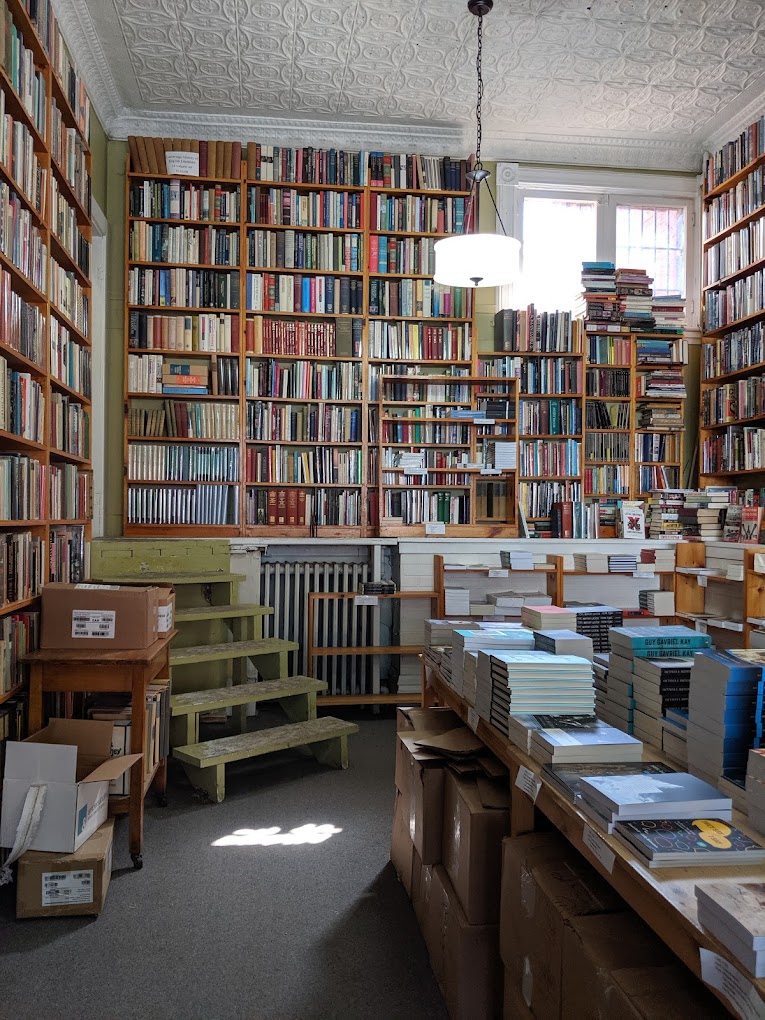In this interview with Benjamin Books owner Mordecai Bubis, produced by Barbara Cuerden for IMAGE Sandy Hill’s print edition, we learn how this small, local bookshop survived all these years, thanks in large measure to its connection to university students. The future for this local Ottawa institution, however, is uncertain.

A bookstore that sells books rather than “merch” feels like stepping into a sanctuary, unadulterated by market algorithms. When Martin Amis died this year in May, I went looking for copies of his books, and was thrilled to find them on a shelf two blocks away from home, pointed out by Mr. Benjamin Books himself, Mordecai Bubis. Then, going from thralldom to dismay, I learned that his store may close soon, and so over the summer we’ve engaged in an on-and-off-line conversation. It’s my pleasure to document portions of that conversation here.
Your bio on the website states: “The firm’s principal, Mordecai Bubis, is an appraiser of books and related material, with experience spanning nearly forty years in the book trade. He received his PhD from the London School of Economics. He has provided appraisals for local, national, and international institutions.” Could you talk about this a little more?
In years past, I lectured at Labour College of Canada, University of Ottawa, and Carleton University. In the late seventies, while a student in England, I came to have first-hand experience of the thriving book trade in London. Benjamin Books was modelled on the examples of many of those great bookstores scattered around the colleges of the University of London. When I returned to Canada in the early 80s, the job market was not great for British-trained academics, especially those focused on socialism. I taught courses in Political Philosophy and in Comparative Government, mostly at the University of Ottawa, but never full time. My PhD dissertation was on aspects of Leon Trotsky’s thought. Since a relatively early age, I was interested in most things within the broad socialist tradition. In my early teens, I was involved in the Vietnam War protest movement. Left-wing politics became an important part of my life. One day after teaching a class, I walked past this vacant space and thought it would be a good place to situate a bookstore—maybe for two or three years. This has turned into two or three decades! The store first opened between First and Fifth Avenues in the Glebe, and was there for 5 years. I’ve been here on Osgoode Street ever since, for the last 35 years.
What about the connection between Ottawa U and your bookstore?
All the great universities used to boast of having good scholarly bookstores on campus or in the vicinity. Many of these are disappearing. For 35 years, I believe, the University of Ottawa has benefitted from our presence on the doorstep to the main campus. It would be nice to see the university step up and incorporate Benjamin Books. The store could become an auxiliary space affiliated with the Ottawa U bookstore, or the department of English, or the U of O Press. These are some possible options worth exploring. If Ottawa U picks up this opportunity, it could preserve a tradition of scholarly bookstores fundamental to academia.
As to the “material culture” of the bookstore: sometimes the book you’re really looking for sits NEXT to the one you set out to find! Do professors and students come to sell you their used books? Are they significant buyers as well?
Our business was for years highly dependent on sales to students. As a consequence of digitization, the proliferation of alternative media, the declining intellectual imagination and, finally, the COVID pandemic, our store has witnessed a considerable decline in this part of our business. Retiring professors frequently sell us their book collections. Young professors, on average, do not seem to read that many books.
What is the most interesting book you’ve bought or sold?
Great books come and go, though at a slow frequency. Coke Smyth’s Sketches in the Canadas (1842), with 22 handcoloured plates in folio casing, stands out as a memorable acquisition. An early English edition of Isaac Newton’s Principia and a first edition of Thomas Hobbes’ Leviathan also stand out as important works handled.
What subject gets your attention every time, and how many books on the subject do you keep for yourself?
I am most interested in books in the category of History of Ideas. — Too many!
When you first started, did you think you would still be doing this so many years later?
Not a chance. A friend recently painted a picture of the store titled “After the Revolution.” Possibly an appropriate title. When I started the business, I would have insisted upon “Until the Revolution.” These days you can find me most mornings outside the Russian embassy with my protest sign “Putin = Fascist.”
What’s next for you?
I find myself in transition, working on another location, still a bookseller but for an international clientele who are interested in specific titles, or searching for “the needle in the haystack” and don’t mind paying mail order prices. I’ve already got another space, 1,000 square feet, already filled with books! It’s an internet sales operation, which fits my plans for semi-retirement at age 70. I’m not yet aggressively looking for a buyer for the Osgoode store collection. I’d really prefer that Ottawa U take over this space and keep the historical connection going.
This interview originally appeared in print, in IMAGE Sandy Hill, October/November 2023 issue, pg. 9
